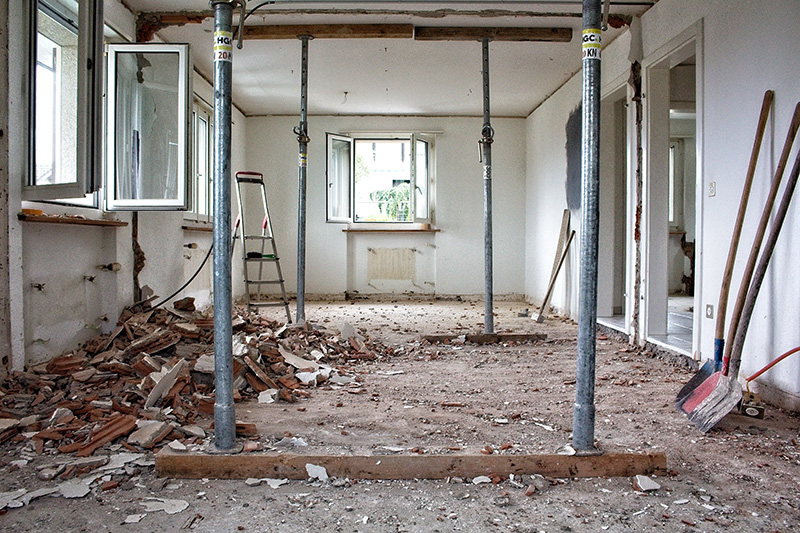But - real estate investing isn’t a magic, get-rich-quick solution. To succeed, and to avoid personal financial problems, aspiring investors need to get a deep understanding of every aspect of investing before diving in. That means everything from real estate lead generation to market analysis to nailing your financing options and how to rehab a home.
If you’re wondering how to start real estate investing, or looking for different ways to invest in real estate - this is the guide for you. We explore the basics of real estate investing, including the different types of investment properties, the benefits and risks, and how to set yourself up for success.
Real estate investing is the purchase, ownership, management, and sale of real estate properties in order to generate a profit.
There are many different forms of real estate investing, including acquiring rental properties, developing new properties, and renovating flipping of existing properties. To fund their continual growth, real estate investors utilize finance options such as borrowing money to purchase a property or using leverage to acquire multiple properties.
The end goal of real estate investing is simple; investors want to generate passive income, increase wealth, and achieve total financial freedom.

Residential real estate investing is about purchasing and owning residential properties like single-family homes, duplexes and apartment buildings. Just like other real estate investments, the goal of residential real estate investments is to generate profit through rental income, property appreciation or both.
The umbrella of residential real estate investing is very wide and includes things like;

Imagine you live in Nantucket and you buy an old cottage by the ocean. You decide to rehab it and list it on Airbnb as a short-term rental, and you manage the bookings and reservations, along with the cleaning between stays.
Suppose you used some sort of lead generator to buy an old 8-unit apartment building that someone in your neighborhood recently inherited, but doesn’t want to pay taxes on and manage.
You begin by thoroughly cleaning and updating the units, and then advertise the units on various rental listing websites and local classifieds and find tenants. And if you don’t outsource management to a third-party property management company, you’re now the landlord and continue to collect monthly rent.
You’re a first-time homebuyer and you find a duplex that fits your budget and has great rental potential. You move into one unit and find a tenant for the other. This means you not only decrease your mortgage payments (you may even turn a profit), but you build equity in your property too!
You find a motivated seller with a distressed property in a good area, with good potential. You purchase the home, bring in a team of contractors to renovate the property, and just like that - the property is worth more.
Then, list the property for sale at a higher price than what you paid for it and boom - you’ve just made a return on your investment.

Real estate wholesaling means you find someone looking to sell their property fast - and while you may not have enough for the purchase, you’re well-connected to other investors with lots of capital.
After negotiating a sale price with the seller, you then go out and present this opportunity to one of your investor friends at a higher price than the sale price. After the sale goes through, you keep the difference between the seller’s and buyer’s sale price.
The BRRRR system is short for "buy, renovate, rent, refinance, and repeat" system,
The goal of the BRRRR system is to acquire undervalued properties, renovate them to increase their value, rent them out to generate passive income, and then refinance those properties to pull out the equity built up through the renovations in order to purchase more properties to then renovate, rent out, refinance, etc etc.

While there are fewer strategies to investing in commercial real estate (i.e. BRRRR and house hacking), the types of buildings that investors are interested in are far more varied.

As we see so many businesses move back to in-office work, office buildings are a popular form of commercial real estate investment. But remember - consider the location, size, and condition of the property, as well as the demand for office space in the area.
Plus, there are more balls to juggle with office buildings in terms of building codes, multiple tenants, safety codes, etc.
Retail buildings can be a lucrative type of commercial real estate investment, as they provide the opportunity to generate income through the rental of storefronts and other retail spaces.
Examples include;
Remember - foot traffic is very important when taking this into account. Even if you can find someone to rent your retail space - without foot traffic, they won’t be there for long.
Industrial buildings, such as warehouses and factories, can be a lucrative type of commercial real estate investment, especially when successful businesses are your tenants.
Industrial buildings cover manufacturing, distribution, and storage. The success of businesses renting industrial buildings depends on the local labor market, so it’s important to account for the availability of skilled labor and the demand for industrial space in the area.
Despite the rise of AirBnb, the demand for hotels remains strong, and they continue to be a viable commercial real estate investment. But remember - location, location, location. You need to assess the local market to determine whether the area’s demand for leisure or business travel will grow or shrink in the coming 20 years.
Self-storage properties are highly attractive investments, usually because they’re located in areas with highly affordable land.
But, keep in mind factors such as the local population and economic growth, the availability of competing facilities, and the convenience and cost of keeping on-site security.
A real estate investment trust (REIT) is a type of investment vehicle that owns and manages real estate assets like office buildings, apartments, shopping centers, and warehouses. While these don’t generate nearly as much return as other forms of real estate investments, they are nonetheless popular for investors that want to shoot for minimal involvement.
REITs allow individual investors to invest in a diversified portfolio of commercial real estate properties without the work that goes along with directly owning those assets. REITs are required to distribute at least 90% of their taxable income to shareholders in the form of dividends, which makes them an extremely popular choice for investors looking for great returns on their investment.
REITs are both publicly traded on stock exchanges and privately held, and there are some that focus on a specific type of real estate asset while others focus on a diverse mix of properties.
Buying land is a very long-term real estate investment. The payoff can be huge - but so can the risk. Land investments can look like many things, such as purchasing raw land for future development or buying land with an existing structure that can be renovated or used for its current purpose.
When considering the purchase of land as an investment, local economic growth potential, zoning regulations and potential development restrictions have to be very top of investors’ minds.
Real estate investment groups (REIGs) are groups that pool funds from multiple investors to purchase and manage real estate properties. REIGs are also the most elusive groups on this list - they’re private, which means you can’t find them via Facebook groups or by giving it a quick Google.
These groups are generally made up of seasoned investors, and getting in usually requires networking with other real estate professionals in the know.
With most things - it’s all who you know.

The lifeblood of any real estate investor’s business is leads. No leads means no deals, which means lead generation plays a tremendous role in the life of any real estate professional.
Below, we’re going to talk all about leads. But keep in mind, motivated leads are the only leads that matter. If they’re not motivated sellers, they’re likely not going to be a great return on your time investment.
An “absentee owner” refers to someone who owns a property but doesn’t live there. Maybe it’s an investment property, or maybe it’s a vacation home that they don't frequently visit. Absentee owners may be more willing to sell their property simply because they don’t want to deal with the hassle and responsibilities that come with owning a property that they don't use regularly.
Inherited properties are those that have been passed down to the current owner, while probate properties are those that were not included in the will of the recently deceased owner and are in the process of being legally transferred to the new owner.
Both represent great investment opportunities, as these new property owners may not want to deal with the taxes and/or hassle that comes with inheriting properties.
High-equity sellers already own a significant portion of their home, having typically paid off a most of their mortgage. As a result, they’ve probably lived in the property for an extended period of time and can be more likely to sell.
These are usually empty-nesters who have raised a family in their home and are looking to downsize or move to a different location. These sellers tend to value convenience over long-drawn out bargaining deals.
"Distressed sellers may be facing financial difficulties or other pressing issues that require them to sell their home quickly, often for less than market value. This can be a win-win situation for both parties, as the seller gets access to quick, much-needed cash and the investor is able to acquire a discounted property.

When property owners fail to pay their taxes, it can sometimes be due to a vacant owner who simply forgot to pay. But more common than not, it’s because the owner is unable to afford the taxes and is therefore seeking to sell the property quickly.
If a property owner is behind on mortgage payments, it may indicate that they are unable to afford the payments and are looking to sell the property quickly
Pre-foreclosure leads are likely facing financial difficulties and unable to afford their property, and will soon be in default. As a result, they may be open to cash offers and willing to sell the property at a discounted price.
Upside down leads, also called, “underwater”, are property owners who owe more on their mortgage than the property is worth. They very likely bought at the peak of the market, and if the market goes down, many Upside Down leads want to get out fast, which means they can be open to cash offers.

The easiest way to generate and scale your number of real estate leads is to use real estate lead generation software like Leadflow.
Generating manual leads involves copious hours of research via skiptracing or Driving For Dollars (more on that below), and for real estate investors who are serious about scaling their business, real estate software is a must.
Real estate skip tracing involves finding contact information for the owner of a property that is not on the market. Skip tracing offers incredible potential because the best deals are those that are not even on the market. In fact, one of the reasons skip tracing contact info for a motivated lead is so lucrative is because many times, these leads haven’t even considered selling as an option.
Being the first to contact these leads represents massive opportunity.

Driving for dollars is a real estate investing strategy that involves driving around neighborhoods and identifying potential investment opportunities by looking for distressed or abandoned properties. This can include homes that are in disrepair, have overgrown lawns, or have visible damage such as broken windows.
These are often distressed sellers, and Driving For Dollars can represent win-win investment opportunities for opportunistic investors.
Seasoned real estate investors know that before investing into any properties, they have to analyze the area. Is it growing? Is it attracting other investments? What does the 30-year outlook look like?
Here are a couple key points to keep in mind when you’re doing a real estate market analysis;

Now that you’re comfortable entering a specific market - it’s time to analyze a specific property.
To analyze a real estate investment property you’ll need to master 2 concepts.
To first determine whether a property is worth investing in, you’ll need to determine what kind of repairs it needs. The process involves the investor or a trusted contractor physically inspecting the property and looking for;
Investors sometimes get caught up in the deal. Remember - a property can need so many repairs that it becomes unprofitable.
To help you estimate property repairs, check out our free home repair estimator.

Running real estate comps, also known as "real estate comparables," is the process of evaluating recent sales of similar properties in the same area to determine the value of a property. This helps investors get an idea of what their target property is worth in the current market and to make informed decisions about buying or selling properties.
Some things comps look at include;
Running comps manually is grueling work, which is why using a one-click real estate comparables tool is your best friend.
Financing options are essential tools for helping real estate investors buy and sell properties. There are lots of financing out there, here are 5 of the most popular;
This is a conventional loan, supported by a government organization like Freddie Mac or Fannie Mae. These loans typically have stricter requirements and lower LTV ratios, but they may be more appealing to investors seeking a lower interest rate and longer terms.
This kind of loan is provided by a private lender and is typically used for properties that are ineligible for conventional financing or for short-term investments. Hard money loans typically have longer terms and higher interest rates, but the approval process is usually quicker.
Homeowners can use a HELOC to borrow money by using the equity in their house as collateral. For investors with a paid-off property or a low mortgage balance, this loan can be a great option. It can be used for a number of things, including the purchase or renovation of real estate.
This type of loan is issued by private investors, as opposed to a traditional lender. These loans can be more flexible, often with fewer qualifications and more lenient terms, but they may also have higher interest rates and can be tougher to come by.
For a personal loan, investors borrow money from a bank, credit union, or internet lender while using creditworthiness and credit score as security for the loan. These loans often have a fixed interest rate, making them a healthy option for investors who don't have enough cash on hand or don't want to spend their own money.

Taxes on real estate investments can blindside beginner investors, so it’s critical to keep a couple tax considerations in mind;
You can depreciate the value of your rental property over a period of 27.5 years (for residential properties), which can offer you a sizable tax benefit by lowering the amount of rental income that is liable to taxes.
Tax deductions for mortgage interest paid on the rental property can help to lower the amount of rental income liable to taxes.
Repair and upkeep expenses that are incurred to keep the property in good condition or improve it may be tax deductible in the year those repairs/maintenance are made.
Investors who sell real estate may be subject to capital gains tax, which is calculated as the difference between the sale price and the purchase price. This tax can be postponed, or in some cases avoided altogether, by using procedures like a 1031 exchange.
State and local taxes should be taken into account by investors because they can differ based on the property's location.
The passive loss regulations state that an investor who does not manage the property may not be allowed to deduct all losses from the rental business from their income.


In order to raise a property's value and rental income, as well as draw in new and keep current tenants, maintaining and improving a property are crucial. A couple things to keep in mind around maintaining & improving properties;
2. General Property Improvements:
3. Energy Efficient Upgrades:
5. Appearance:
Making sure the property has a well-kept outside, including a well-kept lawn, appealing landscaping, and a clean exterior, will help to increase your appeal of to prospective tenants and buyers.


Ongoing education is essential for real estate investors to stay up to date with the most recent trends, laws and regulations, and industry practices.
Here are just a few reasons why real estate investors should never stop learning and always continue to grow as investors;

2. Legal and Regulatory Changes:
3. Technological Advancements:
4. Networking Opportunities:
Real estate networking events offer networking opportunities with other seasoned investors, brokers, and business experts, which can aid a potential investor in learning more about the sector and forming crucial contacts.
5. Professional Development:
Real estate investors can benefit from continuing education by keeping up with industry standards, maintaining their licenses, and meeting requirements for various professional certifications.